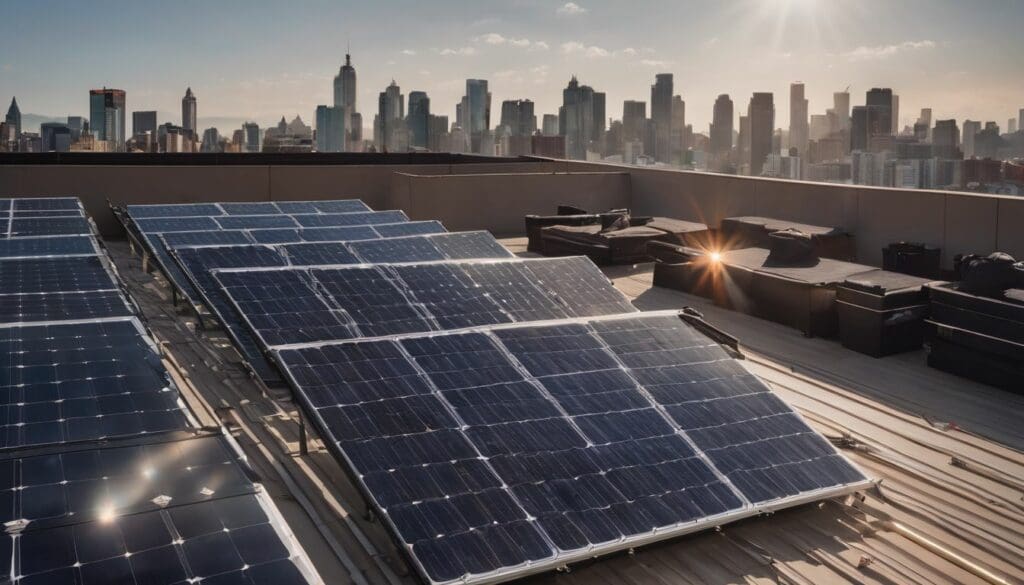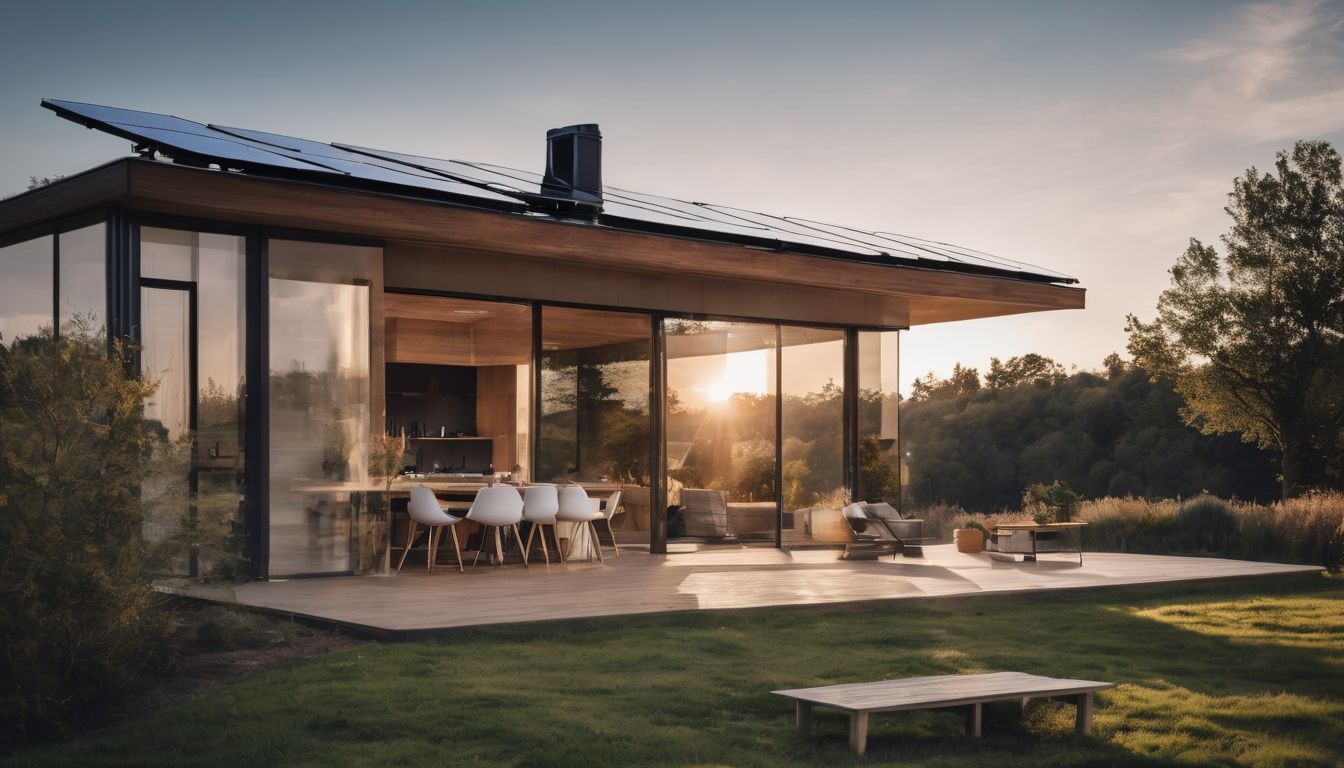Are your solar panels not performing as well as they used to? Dust and debris can reduce efficiency by up to 25%. This blog post will guide you through the simple steps of maintaining your solar panels, ensuring they operate at peak performance.
Keep your energy bills low and your green credentials high – let’s get started!
Key Takeaways
- Regular cleaning and maintenance of solar panels can increase their efficiency by up to 25%, preventing dust, leaves, and bird droppings from blocking sunlight.
- A consistent maintenance schedule including weekly visual inspections and bi-annual cleanings is recommended to keep solar panels in optimal condition.
- Professional inspections are crucial at least once a year to ensure all parts of the solar panel system function correctly and efficiently.
- Protective measures such as hail guards can safeguard your solar panels against extreme weather conditions like hailstorms or high winds.
- Understanding your warranty is key for handling repairs or replacements; it typically covers material defects and guarantees power output levels over time.
What is Solar Panel Maintenance?
Solar panel maintenance involves regular cleaning, monitoring, and repair to ensure optimal performance of the solar panels. It is crucial for maximising energy production and prolonging the lifespan of the system.
Reasons for maintenance
Maintaining your solar panels is key to their efficiency and longevity. It ensures they continue to perform at their best, saving energy and reducing bills.
- Dust, leaves, and bird droppings can obstruct sunlight from reaching the photovoltaic cells. Regular cleaning prevents this build-up, keeping power generation consistent.
- Weather conditions such as rain, snow, and ice may cause damage over time. Inspecting your panels frequently helps in spotting minor issues before they escalate.
- A clear surface maximises energy absorption. Ensuring the panels are free from shade or debris optimises their ability to convert sunlight into renewable energy.
- Performance monitoring detects any drops in output. Swift action can then be taken to rectify faults or inefficiencies in the system.
- Routine servicing prolongs the life of your installation. Well – maintained components are less prone to failures that could lead to costly repairs or replacements.
- Keeping a maintenance schedule aligns with warranty requirements. Many manufacturers demand proof of regular upkeep for warranty claims to be valid.
- Maintaining your setup contributes to overall energy conservation efforts. Efficient systems use less power from non-renewable sources, supporting environmental sustainability.
Importance of regular maintenance
Sustaining the efficiency and longevity of your solar panels demands regular maintenance. Regular upkeep ensures optimal performance, maximising energy production all year round. By neglecting routine care, you risk decreased energy output and potential long-term damage to your investment.
Maintaining your solar panels with a consistent schedule safeguards their ability to convert sunlight into electricity efficiently. This proactive approach minimises downtime and guarantees that you are getting the most out of your solar power system over its lifespan.
How to Maintain Your Solar Panels
To ensure the efficiency and longevity of your solar panels, regular cleaning is essential. You can use a soft brush or sponge with mild soap and water to remove dirt, dust, and debris from the surface of the panels.
Additionally, it’s important to monitor your system’s performance regularly to identify any issues that may require repair or replacement.
Cleaning procedures
To maintain your solar panels, follow these steps:
- Clean the surface using a soft brush or squeegee to remove dirt, dust, and debris without scratching the panels.
- Use a mild detergent mixed with water to gently wash the panels, ensuring all residue is rinsed off thoroughly.
- Avoid abrasive materials or harsh chemicals that may damage the panels and impact their efficiency.
- Check for any signs of corrosion, wear, or loose connections during the cleaning process.
- Perform regular visual inspections to identify any potential issues that may require professional attention.
Monitoring system performance
To ensure optimal solar panel performance, you need to regularly monitor the system. Here are the key steps to effectively monitor your solar panel system:
- Check the inverter display for any error messages or unusual readings that could indicate issues with the system.
- Monitor energy production using the monitoring software provided by the solar panel installation company or third-party applications.
- Keep track of energy generation patterns over time to identify any deviations or drops in performance.
- Inspect the mounting structure and connectors for signs of wear, damage, or corrosion that can affect system efficiency.
- Conduct regular voltage and current checks at various points within the system to ensure consistent performance.
Repair and replacement
To keep your solar panels working efficiently, it’s important to be proactive in monitoring their condition. Regularly checking for signs of wear and tear can help you catch potential issues early. Here are some key steps to remember when it comes to repair and replacement:
- Regularly inspect the panels for any visible damage, such as cracks or discolouration, and promptly address any issues to prevent further deterioration.
- Keep an eye on the performance of your solar panels using the monitoring system, noting any deviations from the expected output that could indicate underlying problems.
- Work with a qualified professional to conduct periodic assessments of your solar panel system, ensuring all components are functioning optimally and identifying any parts that may need repair or replacement.
- Promptly replace any damaged or malfunctioning components with high-quality replacements to maintain the overall efficiency of your solar panel system.
- Consider investing in comprehensive warranty coverage for your solar panels, which may provide protection against unexpected repair costs and replacement of faulty components.
- As part of regular maintenance, clean the panels as dirt and debris can affect their performance over time, but be sure to follow manufacturer recommendations for cleaning methods and materials.
Frequency of Solar Panel Maintenance
It’s important to establish a regular maintenance schedule for your solar panels to ensure optimal performance and longevity. Factors such as location, weather conditions, and panel type may affect the frequency of maintenance.
Recommended schedule
Maintaining solar panels ensures they perform efficiently throughout the year.
| Frequency | Maintenance Task |
|---|---|
| Weekly | Visual inspections for debris or damage |
| Monthly | Check inverter display for system performance |
| Bi-annually | Clean panels to remove dust, dirt, and other residues |
| Annually | Professional inspection to ensure optimal operation |
| Every 5 years | Check and tighten connections and inspect for wear and tear |
| As needed | Replace damaged or underperforming components |
This schedule might vary depending on local conditions and the specific setup you have. Next, consider the factors that can influence how often you should perform these maintenance tasks.
Factors that may affect frequency
Several factors can influence the frequency of solar panel maintenance, including:
- The climate your panels are exposed to, as extreme weather conditions may require more frequent checks and cleaning.
- The location of your panels, with those in dusty or pollen – heavy areas needing more frequent cleaning.
- The age of your solar panels, as older systems may need more regular maintenance to ensure optimal performance.
- The type of technology used in your panels, with different technologies requiring different levels of care.
- The surrounding environment, such as nearby trees and foliage that may cause shading or debris buildup on the panels.
- Any previous damage or wear that could impact the overall functioning of the solar panels.
The Cost of Solar Panel Maintenance
Considering the cost of solar panel maintenance is an important factor in ensuring long-term savings. Compare the expenses of do-it-yourself upkeep versus professional services to make an informed decision.
Do-it-yourself vs professional services
Maintaining solar panels can be done using a do-it-yourself approach or by hiring professional services. DIY cleaning and basic maintenance can be cost-effective, especially if you have the time and resources to do so regularly. However, professional services offer expertise and specialised equipment for thorough cleaning and maintenance, which may extend the lifespan of your panels. While opting for DIY methods can save money in the short term, professional services could ensure optimal performance and long-term cost savings.
When it comes to maintaining solar panels, individuals should weigh the advantages of both options considering their available time, skills, and budget. Professional services may provide peace of mind while ensuring efficient energy production from your solar panel system over time.
Long-term cost savings
Maintaining your solar panels can lead to significant long-term cost savings. By regularly cleaning and servicing your panels, you can ensure they operate at maximum efficiency, leading to higher energy production and lower electricity bills.
Investing in professional maintenance services or using high-quality cleaning kits may require an initial outlay, but the reduction in energy costs over time makes it a financially beneficial choice.
Considering the long-term financial benefits of solar panel maintenance is crucial for maximising their efficiency and ensuring consistent energy savings for years to come. Understanding the potential cost savings associated with regular upkeep motivates individuals to prioritise maintaining their solar panels.
Impact of Extreme Weather on Solar Panels
Extreme weather such as hail, high winds and heavy snow can cause damage to solar panels. Regular maintenance and protective measures are necessary to prevent weather-related issues.
How to protect panels from weather damage
To protect your solar panels from weather damage, consider the following measures:
- Install a hail guard to shield your panels from impact during storms.
- Apply a protective coating to prevent corrosion and damage from UV rays.
- Ensure proper insulation and sealing to safeguard against moisture intrusion.
- Regularly trim nearby trees and vegetation that may pose a risk during extreme weather conditions.
- Invest in high – quality mounting systems designed to withstand strong winds and heavy snow loads.
Handling severe weather damage
Severe weather can have a significant impact on solar panels, affecting their performance and longevity. Here are some important considerations for handling severe weather damage:
- Inspect the panels after a storm to check for any visible damage such as cracks, scratches, or debris accumulation. Remove any debris carefully to avoid causing further harm.
- Check the mounting system for any signs of instability or damage caused by strong winds or heavy rainfall. Tighten loose fasteners and ensure the system is securely in place.
- Monitor the electrical connections for any signs of moisture ingress or corrosion, which can result from exposure to rain or high humidity levels.
- Evaluate the overall performance of the solar panels following extreme weather events to identify any efficiency losses or malfunctions that may require professional inspection or repair.
- Consider investing in additional protective measures such as hail guards, wind deflectors, or surge protection devices to mitigate potential damage from future severe weather occurrences.
Understanding Solar Panel Warranties
Understanding the warranties for your solar panels is crucial in case of any unexpected issues. Knowing what is covered and how to make a claim can provide peace of mind for the long-term maintenance of your solar panel system.
What is typically covered
Solar panel warranties generally cover defects in materials and workmanship. This includes issues with the solar cells, frame, glass, and wiring. Additionally, most warranties offer guarantees for power output, ensuring that panels maintain a certain level of efficiency over time.
Understanding the details of your solar panel warranty is essential for safeguarding your investment. It’s important to know what is covered and how to make a claim if necessary. Being proactive about understanding your warranty can help you address any potential issues swiftly.
Moving on to “How to Make a Claim” under “Understanding Solar Panel Warranties”..
How to make a claim
After understanding what is typically covered in solar panel warranties, it’s important to know how to make a claim when needed. Here are the steps to follow when making a claim under your solar panel warranty:
- Review your warranty documentation carefully and ensure that the issue you are experiencing is covered by the warranty.
- Contact the manufacturer or installer of your solar panels to inform them about the issue and discuss the next steps for making a claim.
- Provide all necessary documentation, including proof of purchase, installation records, and any maintenance or service history related to the panels.
- Follow the specific claim procedure outlined in your warranty documentation, which may include filling out a claim form or providing detailed information about the issue.
- Be prepared to cooperate with any inspection or assessment that may be required as part of the claims process.
- Communicate openly and regularly with the manufacturer or installer to ensure that your claim is processed efficiently and effectively.
- If necessary, seek assistance from consumer protection agencies or legal professionals if you encounter difficulties in making your claim.
Conclusion
In conclusion, understanding the basics of solar panel maintenance is crucial for maximising energy efficiency. Regular cleaning, monitoring system performance, and addressing any damage promptly are essential for long-term benefits.
Whether opting for DIY or professional services, investing in proper maintenance can lead to significant cost savings while ensuring the longevity of your solar panels. Embracing these best practices will help protect both your investment and the environment for years to come.
FAQs
1. Why is solar panel maintenance important?
Regular solar panel care helps keep your photovoltaic panels working efficiently, ensuring you get the most green energy for your home or business.
2. How often should I clean my solar panels?
You should clean your solar panels several times a year, but check the manufacturer’s instructions as some may need cleaning more or less frequently.
3. What happens during a typical solar panel inspection?
During an inspection, a professional checks your solar panels for any damage and ensures they’re operating at full capacity as part of routine upkeep.
4. Can I clean my own solar panels?
Yes, you can use a special solar panel cleaning kit to gently remove dirt and grime from your panels – just make sure you follow safe practices!
5. What might happen if I don’t service my solar panels regularly?
If you skip servicing, dust and debris could build up on the surface, which can lead to reduced energy efficiency and potential long-term damage.
6. Are there companies that specialise in maintaining photovoltaic systems?
Absolutely! There are many experienced solar panel maintenance companies that offer comprehensive servicing schedules to help you take care of all aspects of repair and maintenance.





